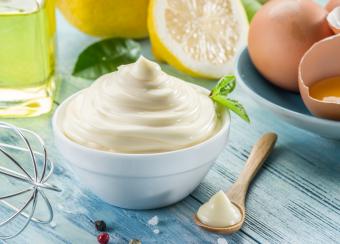
If you have celiac disease or extreme gluten sensitivity, you're probably wondering if mayonnaise is on the list of gluten-free foods. The answer is generally yes, but it depends on the brand you choose and the ingredients used.
Potential Gluten-Containing Mayonnaise Ingredients
It's important to look at mayonnaise nutrition labels to be sure the product is indeed gluten-free. Check mayonnaise labels for gluten-containing thickeners and grain-based vinegars. For example, anything containing malt (such as malt vinegar) has gluten in it, so steer clear of this ingredient when choosing a gluten-free mayonnaise. If the type of vinegar used isn't on the mayonnaise ingredient list, it's best to ensure the food label specifically states the product is gluten-free or steer clear of it.
Wheat-based products sometimes used as thickeners in mayonnaise also contain gluten. The Gluten-Free Society provides a comprehensive list of ingredients and food additives that contain gluten.
What Does Gluten-Free Really Mean?
Gluten-free mayonnaise will often make the claim of "gluten-free" on the food label. Seeing a gluten-free label means it's generally okay to consume it if you have celiac disease or non-celiac gluten sensitivity. The U.S. Food and Drug Administration says to make the claim "gluten-free" on a food label, the product must contain less than 20 parts per million (ppm) of gluten.
Gluten-Free Mayonnaise Brands
Several mayonnaise brands make gluten-free claims on all or some of their products, Examples include:
- Hellman's
- Heinz
- Kraft
- Follow Your Heart
- Spectrum
- Duke's
- Trader Joe's
- Blue Plate
However, not all of these brands make gluten-free claims on all products. It's important to check the ingredient list to know for sure. If the mayonnaise you're considering doesn't say "gluten-free" and has an unspecified type of vinegar listed on the ingredient list, you may want to steer clear.
What About Homemade Mayonnaise?
Making your own homemade mayonnaise recipe is an option if you want to be sure you're not getting any gluten (even in trace amounts). Simply combine pasteurized egg yolks or condensed milk, gluten-free vinegar, a plant-based oil, mustard or mustard powder, salt, pepper, and lemon juice. If someone you know has made homemade mayonnaise in their kitchen (even if the mayonnaise contains only gluten-free ingredients), cross contamination may be a concern.
Avoiding Cross Contamination
Whether you're consuming homemade mayonnaise or commercial varieties, cross contamination is always a potential concern. Even mayonnaise that provides all gluten-free ingredients may come in contact with gluten containing foods during processing (or at-home food prep). Call food manufacturers to be sure if you have celiac disease or extreme non-celiac gluten sensitivity or simply make your own homemade gluten-free mayonnaise by taking precautionary measures to avoid cross contamination.







